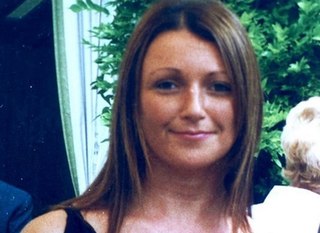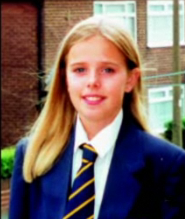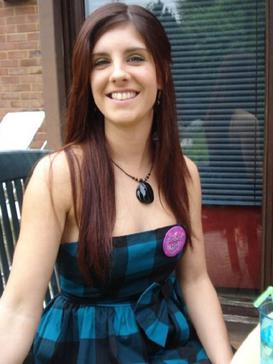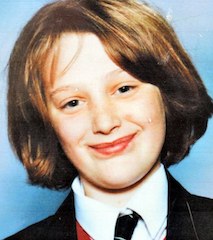Related Research Articles

Forensic linguistics, legal linguistics, or language and the law, is the application of linguistic knowledge, methods, and insights to the forensic context of law, language, crime investigation, trial, and judicial procedure. It is a branch of applied linguistics.

On 21 March 2002, Amanda Jane "Milly" Dowler, a 13-year-old English schoolgirl, was reported missing by her parents after failing to return home from school and not being seen since walking along Station Avenue in Walton-on-Thames, Surrey, that afternoon. Following an extensive search, her remains were discovered in Yateley Heath Woods in Yateley, Hampshire, on 18 September.
The murder of Danielle Jones was an English murder case where no body was found and the conviction relied upon forensic authorship analysis of text messages sent on the victim's mobile phone. Danielle Sarah Jones was last seen alive on 18 June 2001.

The Ipswich serial murders, commonly known as the work of the Suffolk Strangler, took place between 30 October and 10 December 2006, during which time the bodies of five murdered sex workers were discovered at different locations near Ipswich, Suffolk, England, United Kingdom. Their bodies were discovered naked but there were no signs of sexual assault. Two of the victims, Anneli Alderton and Paula Clennell, were confirmed to have been killed by asphyxiation. A cause of death for the other victims, Gemma Adams, Tania Nicol and Annette Nicholls, was not established.

Madeleine Beth McCann is a British missing person who, at the age of 3, disappeared from her bed in a holiday apartment in Praia da Luz, Lagos, Portugal, on the evening of 3 May 2007. The Daily Telegraph described her disappearance as "the most heavily reported missing-person case in modern history". Madeleine's whereabouts remain unknown, although German prosecutors believe she is dead.
It is possible to convict someone of murder without the purported victim's body in evidence. However, cases of this type have historically been hard to prove, often forcing the prosecution to rely on circumstantial evidence, and in England there was for centuries a mistaken view that in the absence of a body a killer could not be tried for murder. Developments in forensic science in recent decades have made it more likely that a murder conviction can be obtained even if a body has not been found.
Arlene Fraser was a 33-year-old woman from Elgin in Moray, Scotland, who vanished from her home on 28 April 1998 after her two children went to school. No trace of her was ever found, but her husband was convicted of her murder, upheld on appeal.
On 19 February 2008, nine-year-old Shannon Louise Matthews, was reported missing in Dewsbury, West Yorkshire, England. The search for her became a major missing person police operation which was compared to the disappearance of Madeleine McCann. Shannon was found alive and well on 14 March 2008 at a Batley Carr house belonging to 39-year-old Michael Donovan. Donovan is the uncle of Craig Meehan, the boyfriend of the kidnapped girl's mother, Karen Matthews.

Claudia Elizabeth Lawrence is an English woman who was last seen and heard from on 18 March 2009. She was employed as a chef at the University of York's Goodricke College at the time of her disappearance. Although the police have treated Lawrence's case as that of murder, with various people arrested but later released, her fate is unclear.

Teresa Elena De Simone was murdered in Southampton, England, in 1979. Her murder led to one of the longest proven cases of a miscarriage of justice in English legal history. The murder occurred outside the Tom Tackle pub and was the subject of a three-year police investigation which resulted in the arrest of Sean Hodgson. Hodgson was convicted of the murder by a unanimous jury verdict in 1982 and was sentenced to life imprisonment. After serving 27 years in prison he was exonerated and released in March 2009. DNA analysis of semen samples that had been preserved from the original crime scene showed that they could not have come from him.

Peter Britton Tobin was a Scottish convicted serial killer and sex offender who served a whole life order at HM Prison Edinburgh for three murders committed between 1991 and 2006. Police also investigated Tobin over the deaths and disappearances of other young women and girls.

The murder of Leanne Tiernan was a high-profile English child murder involving a 16-year-old schoolgirl who was abducted less than one mile from her home on 26 November 2000 while returning from a Christmas shopping trip in Leeds, West Yorkshire, and subsequently murdered. The missing person inquiry which followed was one of the largest in the history of West Yorkshire Police, involving the search of around 1,750 buildings, underwater searches of thirty-two drainage wells, the draining of a two-mile section of a canal and the halting of household waste collections.
Suzanne Pilley was a 38-year-old British bookkeeper from Edinburgh, Scotland, who went missing on the morning of 4 May 2010. Following a highly publicised appeal for information on her whereabouts and intensive police enquiries, her former lover, David Gilroy, was arrested and charged with her murder. He was found guilty by majority verdict on 15 March 2012 and sentenced to life imprisonment. The judge ordered him to serve a minimum of 18 years in prison. The case is controversial because the prosecution obtained a murder conviction without a body. The body of Suzanne Pilley has never been found.

Sian Emma O'Callaghan was a 22-year-old British woman who disappeared from Swindon, Wiltshire, England, having last been seen at a nightclub in the town in the early hours of 19 March 2011. Her body was found on 24 March near Uffington in Oxfordshire. On 19 October 2012, at Bristol Crown Court, Christopher Halliwell, 48, of Nythe, Swindon pleaded guilty to O'Callaghan's murder.

Charlene Elizabeth Caroline Downes disappeared on 1 November 2003, when she was 14, from her home town of Blackpool, a seaside town in north-west England. Downes was last seen in an area of the town centre that contained several takeaway and fast-food units. Lancashire Constabulary, the police force investigating her disappearance, believe that she was murdered within hours of the last sighting.

Rebecca Marie Watts was a British student from Bristol who was murdered in 2015 at the age of 16. In November 2015, her step-brother, Nathan Matthews, was found guilty of her murder and was sentenced to life in prison with eligibility for parole after 33 years. His girlfriend, Shauna Hoare, was found guilty of manslaughter and sentenced to 17 years in prison, although Hoare had insisted to police that she had nothing to do with the killing, or dismembering Watts' body and hiding the parts. Both Matthews and Hoare were also convicted of conspiracy to kidnap, preventing the lawful burial of a body, perverting the course of justice and possession of two stun guns.
Helen Elizabeth Bailey was a British author who wrote the Electra Brown series of books aimed at a teenage audience.

On 20 July 2016, Samia Shahid, a 28-year-old British Pakistani woman, was found dead in Punjab, Pakistan. Although involved in a dispute with her family, she had travelled to Pakistan alone as she had been told that her father was critically ill. Relatives claimed that she had died of natural causes, whereas her husband, Syed Mukhtar Kazim, believed that she had been murdered in a so-called "honour killing"; an autopsy and forensic examination concluded that she had been raped and strangled.

Andrew Paul Gosden disappeared from Central London on 14 September 2007 when he was aged 14. On that day, Gosden left his home in Doncaster, South Yorkshire, withdrew £200 from his bank account and bought a one-way ticket to London from Doncaster station. He was last seen on CCTV leaving King's Cross station. Despite numerous national appeals for information in the years following his disappearance, Gosden's reason for travelling to London that day, and his subsequent fate, have not been established.
Libby Squire was a university student who disappeared following a night out with friends on 31 January 2019 in Kingston upon Hull in the East Riding of Yorkshire, England. In the days following her disappearance, Humberside Police and Squire's parents made a public appeal for information. Police undertook door-to-door enquiries in areas of Hull near to where Squire lived and had last been seen, as well as searching bins, drains and the partially frozen Beverley and Barmston Drain for evidence.
References
- 1 2 3 "Teenager's secret life destined to end in tragedy". The Yorkshire Post. 20 February 2008. Retrieved 19 August 2017.
- ↑ "Missing woman's town link checked". BBC News. 13 July 2005. Retrieved 19 August 2017.
- ↑ Willis, Joe (30 June 2012). "Parents of Jenny Nicholl to mark seventh anniversary of their daughter's death". Darlington and Stockton Times. Retrieved 19 August 2017.
- ↑ Stokes, Paul (16 January 2008). "Married father murdered teenage lover". The Telegraph. Retrieved 19 August 2017.
- 1 2 3 4 Amos, Owen (27 February 2008). "The text trap". The Northern Echo. Retrieved 19 August 2017.
- 1 2 "Jenny 'murdered by married lover'". BBC News. 15 January 2008. Retrieved 19 August 2017.
- ↑ "Dad-of-two killed teen lover in bizarre love triangle, court told". The Northern Echo. 15 January 2008. Retrieved 19 August 2017.
- 1 2 3 Willis, Joe (30 June 2015). "Jenny's killer David Hodgson tried in vain to cover tracks". Darlington and Stockton Times. Retrieved 19 August 2017.
- 1 2 3 Henry, John (19 February 2008). "Mystery remains over musician's murder". BBC News. Retrieved 19 August 2017.
- ↑ Willis, Joe (17 May 2007). "Two years of hope, and two years of anguish". The Northern Echo. Retrieved 19 August 2017.
- ↑ "Missing Jenny – man charged with murder". Ripon Gazette. 18 May 2007. Retrieved 19 August 2017.
- ↑ "Jenny police search septic tank". BBC News. 22 May 2007. Retrieved 19 August 2017.
- ↑ "Nicholl jury considering verdict". BBC News. 19 February 2008. Retrieved 19 August 2017.
- ↑ "Mother's appeal for missing Jenny". BBC News. 9 December 2005. Retrieved 19 August 2017.
- ↑ "Man remanded over Jenny killing". BBC News. 16 May 2007. Retrieved 19 August 2017.
- ↑ "Sandbeck Plantation, Richmondshire - area information, map, walks and more". ordnancesurvey.co.uk. Retrieved 19 August 2017.
- ↑ "Jenny was seen alive after supposed murder, jury is told". The Harrogate Advertiser. 24 January 2008. Retrieved 19 August 2017.
- ↑ Grant, Tim (8 September 2008). "Dr Tim Grant: How text-messaging slips can help catch murderers". The Independent. Retrieved 19 August 2017.
- ↑ "Guilty verdict in Jenny Nicholl murder trial". The Yorkshire Post. 19 February 2008. Retrieved 19 August 2017.
- ↑ Mitchell, Elizabeth (8 September 2008). "The case for forensic linguistics". BBC News. Retrieved 19 August 2017.
- ↑ Norfolk, Andrew (25 November 2009). "Jenny Nicholl: coroner records verdict of unlawful killing despite missing body" . The Times. Retrieved 19 August 2017.